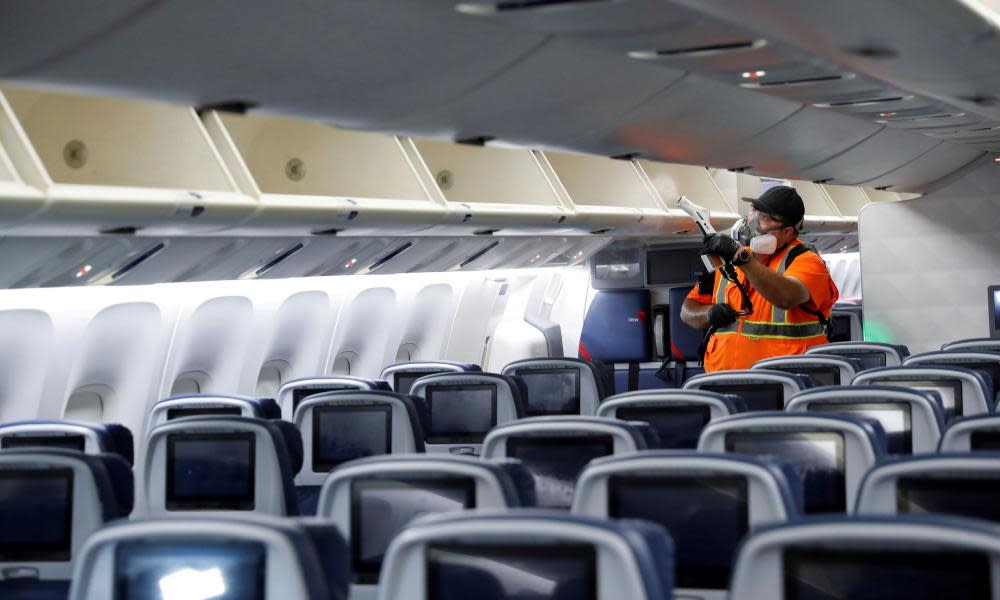Global markets fall sharply despite boost from US plan to relax Covid travel

Global financial markets have fallen sharply amid concern over rising inflation and the threat of contagion in China’s property sector from the debt-stricken developer Evergrande, despite a boost from the relaxation of US travel rules.
Markets around the world came under selling pressure, with the FTSE 100 in the UK slumping by 60 points, or 0.9%, to 6,903.
Europe’s Stoxx 600, a pan-European index of listed companies, closed down 1.7%. Shares fell by more than 2% in Germany, France and Italy and 1.2% in Spain.
US markets also fell sharply, with the Dow Jones losing 1.7%, the S&P 500 closing 1.6% lower and the tech-heavy Nasdaq down more than 2%.
It came despite a rally in airline shares after the US announcement of plans to partially lift a travel ban on UK and EU citizens imposed in response to Covid-19.
Shares in British Airways’ owner IAG soared by 11%, making it the best performer on the FTSE 100, while the jet engine maker Rolls-Royce was also among top risers, with shares ending the day up more than 4%. Shares in the German airline Lufthansa and Air France-KLM rose about 5%.
“The lifting of travel restrictions for double-jabbed visitors to the US provided the thrust needed to send the recovery in airline stocks full throttle,” said Susannah Streeter, a senior investment and markets analyst at the investment firm Hargreaves Lansdown.
The rise in airline stocks helped London’s blue-chip index claw back some losses from earlier on Monday. However, concerns over China’s heavily indebted property sector rattled markets on a choppy day in dealing rooms across the City.
Analysts said that soaring energy costs and wider inflationary pressures risked upsetting the economic recovery from lockdown, at a time when growth in several advanced economies was slowing.
“Still nervousness hangs over the financial markets, with inflation worries nagging investors, particularly with gas prices sky-high. Concerns are also mounting that problems are piling up in the Chinese economy due to the precariousness of Evergrande, the property conglomerate,” Streeter said.
Central banks, including the US Federal Reserve and Bank of England, will provide updates this week, with expectations among financial market investors for a gradual retreat from emergency pandemic stimulus at a delicate juncture for the economic recovery from Covid-19.
Walid Koudmani, a market analyst at the online trading firm XTB, said: “Investors will be keeping an eye on the upcoming central bank decisions later this week along with any new developments in the Chinese real estate market, which could potentially cause a domino effect.”
The annual rate of UK inflation jumped by the highest percentage on record in August from the previous month, reflecting a rapid recovery from last year’s lockdown as well as a sharp jump in food, drink and energy prices.
Wholesale gas and electricity costs have surged to record levels in recent months, pushing several small energy providers into administration and threatening to boil over into a cost-of-living crisis for British consumers this winter.
It comes as investors warn contagion risks in China’s massively indebted property industry could rippled through world markets, after shares in Evergrande plunged on Monday to an 11-year low.
The country’s second-largest real estate developer faces a deadline for debt payments this week, as the firm scrambles to rebuild confidence in the business.
Experts have warned that if the company, which owes $300bn to contractors, investors and homebuyers, defaults on its debts, it could trigger broader issues in the world’s second biggest economy. A crucial interest payment deadline on some of its outstanding bonds looms on Thursday.
Analysts said any downturn in China would have an impact on demand for natural resources, given its status as the word’s largest consumer of many commodities, with worrying parallels to 2015, when fears about Chinese debt troubles prompted a broad-based selloff in financial markets.
Russ Mould, an investment director at the Manchester-based stockbroker AJ Bell, said: “There’s plenty for the market to fret about, and those arguing the markets were looking frothy are seeing some of that froth disappear as a brewing crisis in China, surging gas prices in Europe and concerns about stagflation combine to sink stocks.”

 Yahoo Movies
Yahoo Movies 
